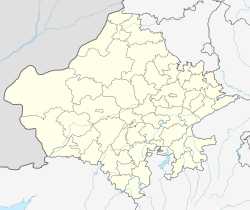Baru or Baroo[2] is a small village in Bap tehsil of Jodhpur district of the Indian state Rajasthan.[3][4][5][6][7]
Baru | |
|---|---|
Village | |
 Sunset view from a rooftop in Baru | |
| Coordinates (Baru): 27°21′45″N 71°53′13″E / 27.3624°N 71.8869°E | |
| Country | India |
| State | Rajasthan |
| District | Jodhpur |
| Tehsil | Bap |
| Population (2011)[1] | |
| • Total | 3,782 |
| Languages | |
| • Vernacular | Marwari |
| • Official | Hindi |
| PIN | 342301 |
Geography
editWhile the western and southern sides of the village are filled by sand dunes, the northern side is a mix of sand dunes and plain, and the eastern side is mostly plain.
Baru lies in an arid region, with Monsoon season starting from late July and continuing till early October to supply some water to the region.
The region goes through extreme climate throughout the year, wherein the temperature dips to 0-degree in winter(December to January end) and rises as high as 50-degrees in summer(April to early July).
History
editDue to arid conditions, villagers used to depend on old deep wells, locally known as Koyar, for daily water needs. Since the water was scarce, agricultural produce of the village was limited to a few of the Rabi crops, i.e. pearl millet(Bajra) and Mustard(Raydo). The main trade of the villagers was cattle rearing. Cows were raised for milk, as it was part of daily meals in a household, and goats were mostly raised to be sold to cattle-traders coming from outside of the village. During this time, there was no electricity in the village and one or two household had solar power. The lack of electricity was due to poor road-connectivity to neighbouring town, which is 80 kilometres from the village.
It all changed around the year 2005, when the state government first connected Baru to neighbouring town and then started distributing electricity to it. Soon enough, after facing multiple setbacks, water department of the state government found out that there is groundwater, albeit full of fluoride, in the vicinity of Baru by successfully installing a state-sponsored borewell. To improve the livelihood of villagers, government started giving loans so that villagers can install borewells and take part in agricultural enterprise. As a result of borewells, the enterprise of cattle rearing has subsided and given rise to agriculture thereby boosting agricultural export from the village.
Additionally, the village has various old temples, including the Khinwanj or Khinwal mata(mother) temple, Thakur Ji temple.
Economy
editAgriculture is the foundation of Baru's economy.[8]
The farmers here usually grow:
- Mustard(Raydo)
- Wheat(Gehu)
- Pearl millet(Bajra)
- Cumin(Jeera)
- Psyllium(Isabgol)
- Arugula(Taramira)
- Ricinus(Arandi)
- Ground nut
The economy is further spun around this agricultural enterprise as villagers buy and sell seeds, pesticides, tractors and other agricultural equipments.
References
edit- ^ https://censusindia.gov.in/nada/index.php/catalog/1072/download/3302/DH_2011_0815_PART_A_DCHB_JODHPUR.pdf
- ^ "Bap tehsil", Wikipedia, 24 January 2024, retrieved 17 June 2024
- ^ "तेज आंधी के साथ गिरे ओले, बारिश से भरा खेतों में पानी". Dainik Bhaskar (in Hindi). 26 March 2020. Retrieved 19 January 2021.
- ^ "धोलिया गांव में आग से जले 3 पड़वे". Dainik Bhaskar (in Hindi). 19 February 2018. Retrieved 19 January 2021.
- ^ "विधायक विश्नोई ग्रामीणों से हुए रूबरू". Dainik Bhaskar (in Hindi). 12 February 2018. Retrieved 19 January 2021.
- ^ "नियुक्ती: बाप ब्लॉक में 15 व भोपालगढ़ ब्लॉक में 7 नए डॉक्टर मिले". Dainik Bhaskar (in Hindi). 19 December 2020. Retrieved 19 January 2021.
- ^ "Baru CHC" (PDF). NRHM RAJASTHAN. 26 March 2020. Retrieved 19 January 2021.
- ^ "बाप के दाे दर्जन गांवों में फैला टिड्डी दल, खेतों में चौपट हो रही फसलें". Dainik Bhaskar (in Hindi). 12 September 2019. Retrieved 19 January 2021.
